|
5/1/2018 Everyday Holiness: Ten Quotes from Pope Francis’ Apostolic Exhortation to Help You Be Holy in Today’s WorldRead NowOn April 9, the Solemnity of the Annunciation of the Lord, Pope Francis released his latest Apostolic Exhortation: Gaudete et Exsultate (Rejoice and Be Glad): On the Call to Holiness in Today’s World. This is the third Apostolic Exhortation of his papacy, following Evangelii Gaudium, the Apostolic Exhortation on the Proclamation of the Gospel in Today’s World and Amoris Laetitia, a post-synodal Apostolic Exhortation on Love in the Family. What was his goal? “To re-propose the call to holiness in a practical way for our own time, with all its risks, challenges and opportunities" (GE 2). Without delving too much into a theological or heady definition of holiness, Pope Francis invites us simply and straightforwardly to open ourselves to the specific and unique mission God has created us for. In this, he says, lies true joy and freedom. Our Holy Father takes us back to the Source of Holiness, Jesus Christ, and encourages us to look to the Beatitudes as guides for holiness. Below, I’ve compiled some of my favorite quotes and key take-aways from this approachable, yet profound, exhortation. 1.“The Lord asks everything of us, and in return he offers us true life, the happiness for which we were created. He wants us to be saints and not to settle for a bland and mediocre existence.” -GE 1 Pope Francis echoes his predecessors in reminding us that following Christ leads to an abundant, joyful, and exciting life. We often do not equate holiness to greatness, but that’s what it is. Though God expects a lot from us, he gives us so much more: true life and happiness. Our Holy Father is reminding us that holiness makes us truly happy by calling us to live abundantly. 2. Holiness is the most attractive face of the Church. -GE 9 Many of us might have grown up thinking that holiness is boring and that sanctity is impossible, so why is Pope Francis saying that holiness is the most attractive face of the Church? What does this mean? When we embrace holiness, we become who we were created to be; we become our most authentic selves. This authenticity, this freedom, is attractive. It makes the Church come alive through each of her members. When we are striving for holiness, we are becoming our best and most loving selves. This witness is what evangelizes – it invites others to pursue their own journey of holiness. 3.The important thing is that each believer discern his or her own path, that they bring out the very best of themselves, the most personal gifts that God has placed in their hearts (cf. 1 Cor 12:7), rather than hopelessly trying to imitate something not meant for them. We are all called to be witnesses, but there are many actual ways of bearing witness. -GE 11 Oftentimes, it’s easy to compare ourselves with others. It’s tempting to see the gifts and talents of others and ask ourselves why we do not have the same. The Body of Christ is made up of all different parts – each necessary for the functioning, health, and well-being of the body itself. Here, Pope Francis reminds us that there are as many paths to holiness as there are people. Each of us was designed specifically by God for a unique purpose. We do not have to become St. Francis, St. Vincent Pallotti, St. Mother Teresa, St. Joan of Arc, or St. Francis de Sales. We become saints by becoming most fully and authentically who God made us to be: ourselves. 4.To be holy does not require being a bishop, a priest or a religious. We are frequently tempted to think that holiness is only for those who can withdraw from ordinary affairs to spend much time in prayer. That is not the case. We are all called to be holy by living our lives with love and by bearing witness in everything we do, wherever we find ourselves. – GE 14 In this passage, Pope Francis reminds us of the universal call to holiness which has its inception in the Gospel and which the Church has explicitly reminded us since the closing of the Second Vatican Council. Holiness is not reserved for those with theology degrees, the ordained, monks, or religious. It is not reserved for those who work for the Church or volunteer with acts of service. It is for each and every one of us: the high school student studying for exams, the single parent, the politician developing laws for his or her constituents, the factory worker, the refugee far from home, the married couple starting or raising a family, the list goes on and on. Whatever vocation, profession, or place in life we find ourselves in, let us infuse it with love in order to become holier each and every day. 5.In the Church, holy yet made up of sinners, you will find everything you need to grow towards holiness. The Lord has bestowed on the Church the gifts of scripture, the sacraments, holy places, living communities, the witness of the saints and a multifaceted beauty that proceeds from God’s love, “like a bride bedecked with jewels” (Is 61:10). -GE 7 Sometimes the journey of holiness seems impossible. We can get tired and beaten down by our own weaknesses and failures, and by the multitude of temptations and trials that seem to present themselves at every step. Here, Pope Francis is reminding us that Jesus Christ gives us everything we need to be holy. Our growth in holiness cannot exist apart from Christ’s Church. Though the Church is not perfect, it is in the Body of Christ that we have access to Scripture, the sacraments, and community, so that we can have the help of others who are also striving for holiness. Do not forget to use these invaluable resources, to go back often and drink from the well of life, in order to get the strength you need to continue your journey of holiness. 6. This holiness to which the Lord calls you will grow through small gestures. -GE 16 This quote reminds me of the often-referred to statement of St. Mother Teresa: “…do small things with great love.” Holiness does not happen overnight. It involves millions of decisions and actions – each one leading us closer to or further away from our goal. Pope Francis reminds us that we are called to grow in holiness in a way that may seem small and ordinary. Cleaning a dish can become an act of holiness—so can changing a diaper, writing a paper, tending a garden, submitting a work report, or sitting in traffic. Greatness, then, lies in the little things. This is the little way St. Therese of Lisieux shared with the Church. It can lead to great sanctity. 7.Each saint is a mission, planned by the Father to reflect and embody, at a specific moment in history, a certain aspect of the Gospel…Every saint is a message which the Holy Spirit takes from the riches of Jesus Christ and gives to his people. -GE 19, 21 Each of us are a product of our times. We were born at a specific time and place in order to live out a specific mission. We don’t often think ourselves as “a mission,” as Pope Francis says, or as “a message,” but these are beautiful ways to think about our lives and the weight and dignity of each one. By thinking about our lives in this way, we see that each of us is planned by the Father at this exact moment in time and that our lives, actions, and interactions with others are invaluable. If we do not share the message God created us to impart, no one else will. 8.Just as you cannot understand Christ apart from the kingdom he came to bring, so too your personal mission is inseparable from the building of that kingdom…Your identification with Christ and his will involves a commitment to build with him that kingdom of love, justice and universal peace. -GE 25 After Christ’s Resurrection and before his Ascension into heaven, he gave his disciples a clear command: “Go, therefore, and make disciples of all nations, baptizing them in the name of the Father, and of the Son, and of the holy Spirit.” The same commission resounds for us today. Jesus came not only to overcome sin and death, but to build his kingdom on earth. For this reason, Pope Francis reminds us that we “cannot understand Christ apart from [his] kingdom.” Before joining Christ in Heaven, we’ve got work to do. We join Christ in his mission by working to create a world of “love, justice and universal peace.” Holiness, therefore, is not for us alone, but for society, for others, and for the world. 9.The presence of constantly new gadgets, the excitement of travel and an endless array of consumer goods at times leave no room for God’s voice to be heard…Sooner or later, we have to face our true selves and let the Lord enter. -GE 29 The world today is an incredibly noisy place. Our access to technology enables us to be plugged in at almost every moment of the day. We see screens on our computers, smartphones, and televisions; we are bombarded by advertisements; we spend hours on social media. Without demonizing technology or refuting its benefits, Pope Francis reminds us of the temptation to drown out the voice of God with noise. If we are unable to hear the voice of God, then we will be unable to attain the holiness to which we are called. How can we carve out more time for God today in silence and in prayer? 10.Do not be afraid of holiness. It will take away none of your energy, vitality or joy. On the contrary, you will become what the Father had in mind when he created you, and you will be faithful to your deepest self. To depend on God sets us free from every form of enslavement and leads us to recognize our great dignity. -GE 32 Our world often views holiness as boring, enslaving, or downright impossible. Here, Pope Francis beautifully reminds us that holiness leads to true authenticity and freedom. Rather than limit our lives or diminish them with rules, regulations, and boredom, holiness leads to joy and vitality. Embracing who we were made to be leads to true happiness and satisfaction, rather than chasing the empty things of this world or trying to be who we are not. Let us not fear holiness, but strive for it wholeheartedly! **This is part one of a two-part series of quotes from Pope Francis’ latest Apostolic Exhortation: Gaudete et Exsultate. For more information and resources on Gaudete et Exsultate, please click here. Questions for Reflection: Do these quotes from the Holy Father surprise or excite you? How has your perspective of holiness changed after reading some of these words from Pope Francis?
0 Comments
“Love is…the fundamental and innate vocation of every human being.” (John Paul II, Familiaris Consortio, 11). Mankind was created in the image and likeness of God in order to love and to be loved. This divine vocation is made possible by the Father’s love for us: we love because we were first loved (cf. 1 Jn 4:10). In October of 2014 and 2015, bishops from around the world met at the request of Pope Francis to discuss human love, specifically in the context of marriage and family. The themes touched upon included "the pastoral challenges of the family in the context of evangelization" as well as "the vocation and mission of the family in the Church and in the contemporary world." After two years of discussion, reflection, prayer, and deliberation, the Holy Father compiled the ideas gathered from the synods into a post-synodal Apostolic Exhortation, Amoris Laetitia. Using both poetic and approachable prose, Pope Francis shared with the Church his insight into the joy and dignity of human love—writing on topics such as the Church’s teaching on marriage and family, the education of children, and pastoral strategies for marriage preparation. On July 12th, Center Director Fr. Frank Donio, S.A.C. used the wisdom found in Amoris Laetitia to present on its pastoral implications for marriage preparation using Facebook Live. You can view his presentation here. Below are nine quotes and lessons from this historic document that are especially pertinent to couples preparing for marriage and those preparing couples for marriage. I invite you to spend some time reading these quotes, reflecting on them, and implementing the truths they contain into your understanding of marriage and marriage preparation. 1. Marriage Preparation begins at birth Marriage preparation begins from birth – we are born into families, grow up in the context of family, and are surrounded by families throughout our lives. For this reason, Pope Francis says that “Learning to love someone does not happen automatically.” It is a lifelong process which we must choose to grow in each day. 2. Quality of content over quantity. As couples gather together to prepare for marriage, Pope Francis recommends that we do not overwhelm them with every single resource from the Catholic Church. Since the time of marriage preparation is usually brief, the Holy Father recommends sharing quality information—such as the fundamental aspects of marriage, church teaching, and a basic understanding of the kerygma, or story of salvation. Marriage preparation should be comprehensive, but it cannot be exhaustive or total. Be prudent and intentional about the quality and quantity of information you are sharing. 3. Highlight prayer as an essential part of marriage. Prayer is fundamental not only to the Christian life, but to any vocation. For the lifelong commitment of marriage to succeed, it must be rooted in the daily prayer of husband and wife. This prayer has two dimensions: personal and communal. Personal time of prayer and reflection ensures that each spouse is growing in their relationship with Christ, while prayer as a couple unifies the spouses, improves their communication with one another, and grounds their relationship in Christ. When both personal and communal prayer are alive within a marriage, the relationship of husband and wife is being revitalized and strengthened in such a way that can reflect the love of the Trinity and pour out into society as a whole. 4. Marriage is a life-long commitment. Sacraments and major life events should be celebrated in a way outside of our ordinary day-to-day life. Marriage is no different. We are, in fact, celebrating something beautiful and life-changing. However, we should not let ourselves be carried away by the details of planning the “perfect wedding day.” Pope Francis advises couples not to get too invested in the consumption of material goods or the planning of the wedding day itself, inviting them instead to focus on rooting their relationship in Christ, the sacraments, and prayer. 5. Marriage is more than the wedding ceremony. Marriage preparation encompasses much more than a formal program, retreat, class, or a weekend geared to meet a checklist for the church. Formal marriage preparation should help couples discover the dignity of the married vocation and set their sights on the life they will make together as “one.” The ceremony is not “the end of the road,” as Pope Francis states, but a necessary part of the sacrament. We are called to help couples see the wedding ceremony as a launchpad moving them forward in their life-long calling. We are furthermore called to give couples the tools and strategies for successfully working through trials and difficult moments together. 6. Marriage is “total.” The Catholic Church affirms marriage as an indissoluble union grounded in fidelity, fruitfulness, freedom, and totality. Marriage is not simply a convenient relationship, a partnership with someone who makes you happy, or a public display of love—though it can comprise all of those things. The Church understands that marriage is a sacrament administered by man and wife, witnessed by the Church community, and blessed by God. It is a serious but heroic, joyful, and sanctifying undertaking “until death do us part.” 7. Give couples the tools they need to detect danger signals in their relationships and respond constructively. Preparation for marriage should be filled with joy. However, it is still a time of preparation. Each relationship will have moments of unity and conflict. A couple may agree on issues like raising children or budgeting, while disagreeing on how to spend free time or how to best communicate. It is important for each couple to be aware of any sources of woundedness or conflict in their relationship before the wedding day in order to work on constructive practices for moving forward. 8. Explain the significance behind the liturgical celebration and the meaning of each of its signs. While we are not called to get “wrapped up” in the wedding day, we are called to dispose ourselves to the profound significance of the liturgical celebration of marriage. Marriage is a sacrament. To enter into this sacrament is of vast significance. For this reason, it is important to learn more about and understand the meaning behind the signs used in the liturgical celebration – the rings, the white dress, the vows, etc. Let us help couples preparing for marriage enter into the wonder of the sacrament through the richness of the liturgical celebrations of the church. 9. Help couples preparing for marriage discover or rediscover the dignity and beauty of marriage. It’s tempting to be disheartened by the lack of successful marriages we see in the world around us. Marriages can be overwhelmingly broken, destructive, or lifeless. This is not part of God’s original plan for marriage, and Pope Francis wants to encourage engaged couples to discover or rediscover the dignity and beauty of marriage as a liberating, sanctifying, unconditional relationship in which each spouse is loved and affirmed. How can you support married couples or those planning on getting married? How can you change the marriage narrative to better reflect God’s plan? For more resources on Marriage and Family, please click here.
It was the Second Vatican Council which decreed, "From the very beginning of the church men and women have set about following Christ with greater freedom and imitating him more closely through the practice of the evangelical counsels, each in their own way leading a life dedicated to God." It is on this observation that I write in commemoration of the close of the Year of Consecrated Life, which Pope Francis inaugurated on November 30, 2014 (the First Sunday of Advent) and concluded on February 2, 2016 (the Feast of the Presentation of Jesus in the Temple). Addressing all consecrated people in an Apostolic Letter, His Holiness expressed three aims for this great year: first, “to look to the past with gratitude;” second, “to live the present with passion;” and third, “to embrace the future with hope.” Similarly, he called upon the laity, “who share with them the same ideals, spirit and mission,” and the whole Christian people to become more aware of the gift of consecrated men and women, “heirs of the great saints who have written the history of Christianity.” Growing up, I was blessed to have been taught, mentored, and befriended by a number of consecrated religious, namely the Sisters of the Resurrection and the Lasallian Brothers. When I arrived at The Catholic University of America, however, my exposure to consecrated religious expanded to include the Order of Friars Minor (Franciscans), the Order of Preachers (Dominicans), the Little Sisters of the Poor, the Servant Sisters of Mary Immaculate, and the Pallottines (and their Apostolate Center!), to name a few! As I got to know each of them, I became more aware of the joy and the grace inherent of their living out their respective Order’s charisms and spirituality, be they involving education, service, contemplative prayer, or dogmatic theology. In spite of the differences between each order and the varying reasons each member had for professing, there remains one commonality: desiring to follow Christ and seeking to imitate Him more closely in a life dedicated to God. Of course, there are many ways of doing this— each religious order accomplishes this in accord with its unique spiritual character and gifts— as St. Vincent Pallotti encouraged, “Seek God and you will find God. Seek God in all things and you will find God in all things. Seek God always and you will always find God.” How one discerns entering religious life does not mean one has to force a change in his or her lifestyle; rather, it an acceptance of who one is and surrendering that to the God so loved since Baptism, thereby consecrating him or herself “more intimately to God’s service and to the good of the Church” (CCC 931). In my own discernment, I have found great relief in this understanding— that I can give myself to God as I am in love and He will help me to focus and purify that love in my heart which is to radiate from every action of Christian living. Similarly, the famed Trappist monk Thomas Merton expressed the relationship between discernment and the discerner: Discerning vocation does not mean scrambling toward some prize just beyond my reach but accepting the treasure of true self I already possess. Vocation does not come from a voice “out there” calling me to be something I am not. It comes from a voice “in here” calling me to be the person I was born to be, to fulfill the original selfhood given me at birth by God. As the Year of Consecrated Life concludes, let us remember that it concerns not only consecrated persons but the entire Church! Where would the Church be without the examples set by Saints Francis and Augustine, Ignatius and Dominic, or Vincent Pallotti and (soon-to-be-Saint) Mother Teresa and repeated in their respective Orders? The Church would no doubt be less effective in its charity and evangelization, as Blessed Pope Paul VI observed, “the ‘salt’ of faith would lose its savour in a world undergoing secularization.” Let us then respond to Pope Francis’s call to give thanks for the incredible work done by religious around the world and for their fidelity to their respective charisms while seeking to draw close to them in times of joy and trial and assisting them in their holy endeavors. Finally, let us continue to pray for God to send more numerous vocations among their ranks: may their discernments be a model for our own, that we may echo the words of the great Carmelite Saint Thérèse of Lisieux, “At last I have found my vocation: My vocation is love.” Have you ever wondered about women and their place in the Catholic Church? I have. When I was little, I wanted to be the Pope (before I decided my dream was to become President, of course). Only then did I discover that since I was a girl, I could not become the Pope. That infuriated me as a small child, and sparked my interest in learning more about my life’s vocation as a woman of faith. Only as I have grown older have I begun to learn how I can actively participate in my faith traditions, as a layperson and as a woman.
Women have a role in our faith. We are witnesses and called to be exemplary versions of ourselves. We are called by Christ to function in our Church using our own gifts, talents, and love. The example of women leaders in our Church shines through to us in the lives of many female saints and other women in our Church who used their femininity to do God’s will. We read about Mary Magdalene, Martha, and Mary who were friends and followers of Jesus and who were with him throughout his ministry on earth. Later in the 14th century we see St. Catherine of Siena, who helped bring the papacy back to Rome. St. Clare of Assisi founded the female religious order similar to Franciscans. St. Therese of Lisieux is a Doctor of the Church, thanks to Blessed Pope John Paul II. These women and countless others have made their mark on the Church in critical and defining ways, allowing other women to look up to them and see how to live out God’s love through actions and service. In Mulieris Dignitatem, a 1988 apostolic letter by Blessed Pope John Paul II, he says, “Holy women are the incarnation of the feminine ideal.” This tells us to follow the example of the holy women in our Church, who taught us all a great deal about the special place women hold. The New Evangelization needs women to be examples of true womanhood. What is a true example of womanhood, you might ask? Who do we look to for guidance? Well, Mary, the Mother of God is a perfect place to begin. In the Blessed Mother, we see a sinless woman, courageous and steadfast in her faith, who said the ultimate “Yes” to God at a young age. In the face of adversity and rejection, she showed how strong her faith was by bearing the Son of God and then delivering her child in a stable. No simple feat! Throughout Jesus’ life, she was with him, both in person and in prayer. When he was lost and teaching in the temple, she worried like any mother would about her son, then pondered these things in her heart; at the Wedding of Cana, she knew when he needed a nudge to begin his ministry; at the foot of the cross, she wept for the life and humanity of her son. As a woman and a mother, we see Mary’s grace and strive to imitate her desire to do the will of God, unwavering in faith and holiness. As true, confident, feminine examples of love and generosity, we need to know and understand Church teachings and desire to do more as laity in our Catholic faith. As individuals we are a part of the Body of Christ, with an important responsibility to love and with incredible opportunities at the end of our fingertips. Mulieris Dignitatem encourages us—women of faith—to deepen our own understanding about ourselves, and be a witness of faith. We must recognize that our vocation is to understand and teach the faith, to evangelize the world, to desire to grow ever more deeply in Christ’s love, to care for the poor and destitute, and even to answer the call to religious life. But, the most important of these things is to love unconditionally. As Blessed Teresa of Calcutta said, “Not all of us can do great things. But we can do small things with great love.” In our faith today, we sometimes see people questioning where and how women should participate in our faith and its traditions. This is an issue that many on both sides of the spectrum feel strongly about. The New Evangelization is a way for all people who are members of the Body of Christ—especially women—to reconnect with God and to rekindle the desire to live our lives to their fullest potential. Krissy Kirby is a Senior at The Catholic University of America and a Resident Minister through the Office of Campus Ministry. Every Feast Day or Solemnity in which the Church honors Mary, it seems that with a great deal of consistency church music directors across the country choose to make (Composer’s) Hail Holy Queen a part of the Mass for that day. Without fail, whenever I hear this song, I can’t help but crack a smile as everything in me wants to break into the song and dance of Sister Mary Clarence and her fellow nuns found in the hit 1992 movie Sister Act.
Sister Act follows the story of Delores Van Cartier, a lounge singer in Reno who witnesses her lover, an undercover mafia member, murder one of his assistants. After escaping, authorities place her in witness protection at St. Catherine’s Convent where she takes on the guise of a nun, becoming Sister Mary Clarence. At first she has a great deal of difficulty keeping up with the daily schedule of early mornings, prayer, fasting and the simple lifestyle but soon finds a home putting her music background to work directing the choir (in much need of the help, I might add). A classic film among my family, I recently revisited this movie over the holidays. At one point there’s a conversation in which the Mother Superior chastises Sister Mary Clarence for sneaking out at night with the other sisters to visit one of the neighborhood bars. While the Mother Superior sees the convent’s walls as a means of protection, Sister Mary Clarence argues that they prevent the Sisters from going out into the community. Later we see a softening of the Mother Superior’s heart as she allows the Sisters to go out into the surrounding inner city neighborhood to meet and embrace the people. Not to mention, the improved musical styling of its choir, under Sister Mary Clarence’s directorship has struck a chord with the surrounding youth of the area (just look at marker 1:48 in the video). While these moments may scream of a 1990’s, somewhat cliché filmmaking style, today it also screams something else to me – the new evangelization. Once the sisters move beyond the walls of the convent they begin to take on what Pope Francis refers to in his Apostolic Exhortation, Evangelii Gaudium, as an “Evangelizing Community.” Pope Francis elaborates, saying, “An evangelizing community knows that the Lord has taken the initiative, he has loved us first (cf. 1 Jn 4:19), and therefore we can move forward, boldly take the initiative, go out to others, seek those who have fallen away, stand at the crossroads and welcome the outcast” (24). As we see images of the sisters jumping rope and dancing with teenagers on the street, handing out food to the homeless, creating a safe playground for children, and greeting patrons in front of a local adult video store, it’s clear they have embraced those on the fringes of society and welcomed them. Pope Francis emphasizes that “an evangelizing community is filled with joy; it knows how to rejoice always” (24). If there’s any doubt about the joy of these Sisters just listen to their rendition of Hail Holy Queen and try not to crack a smile the next time to you hear it at Mass. And don’t forget to share that joy with someone else! David Burkey is the Communications Coordinator for the Catholic Apostolate Center I hope everyone has been enjoying the best season of the year! While secular Christmas music and decor can be nice (and luckily, because they’re ubiquitous), I am referring to the liturgical season of Advent. My friends believe Advent to be my favorite time of year because it typically needs considerable defense against the encroachment of the Christmas season, and I am happy to defend it. We need Advent. In my last post, I stated that if we don’t make time to consider consciously what vision we want to move towards, we’ll never move towards it. Advent is the season during which the Church encourages us to do just that.
So allow me to profess my love for this season. This profession might seem fairly theologically-minded, but I’m a firm believer that thoroughly theological reflection is often eminently practical - when we reflect on our vision, our subsequent actions reflect whether or not we truly envision something important. Looking forward to Christmas alone is the small-minded view of Advent. Yet somehow, it’s the view that even this well-catechized Catholic girl espoused until college – and I don’t think I was alone. Certainly, Christmas is one thing for which we’re preparing. Through our Christmas liturgies, we want to adequately remember and celebrate the miraculous divine self-emptying gift that is the Incarnation, and as always, the salvation that resulted from it. Most Advent calendars and other such aids help us towards this goal. However, when I listen to the Advent liturgies, I hear a different exhortation. The first Sunday alone, we heard of eternal justice, power and great glory, and were told, “Your redemption is at hand.” Even if I listen just to the Lord’s Prayer, the first half expresses our hope for the fulfillment of several things which the original Christmas enabled. These Scriptures point me toward the greater reality for which we are currently preparing: the eschaton, or the reign of God on earth. I’ve always been fascinated by the concept of the eschaton. The Kingdom of God is here already? But not yet? It is “at hand”? What does this language of faith mean? Simple. In one of his homilies on Ezekiel, Pope Gregory the Great compares the joy we have now to the joy in store: “The fire of love which begins to burn here on earth, flares up more fiercely with love of God when he who is loved is seen.” Already, we can welcome the fire of Christ’s love into our hearts. But not yet - that love gets inexpressibly better. Advent is a season of hope, and the true beauty of hope is that we believe one day it will be fulfilled. The greatness of Advent is that eventually it will become obsolete. Take a minute with me this Advent to think about our vision, the Kingdom of God; All injustices will be made right. We will be living with God, in a world without end. We will no longer get in our own way and separate ourselves from Him. We will glorify Him as we should. There will be no holds barred from His all-encompassing love. This is what we wait for. This is our hope. This is the reality of which Advent reminds us, provided we don’t skip past it. How can we be anything but joyful? Laura Berlage serves as an Echo Faith Formation Apprentice in the Diocese of Camden, NJ |
Details
Archives
July 2024
Categories
All
|
About |
Media |
© COPYRIGHT 2024 | ALL RIGHTS RESERVED

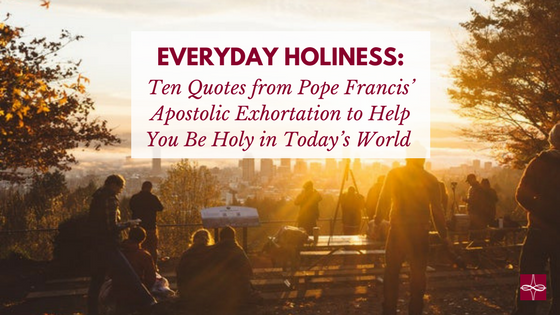

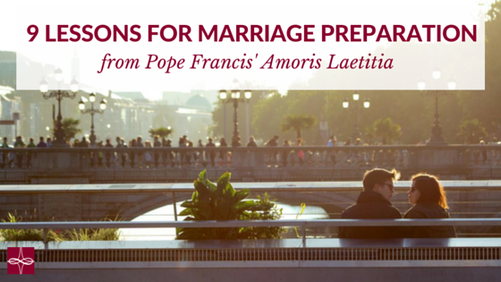

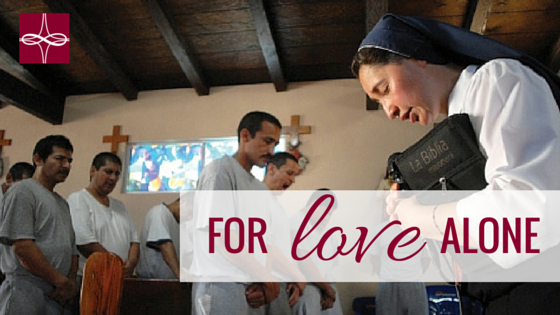
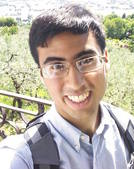
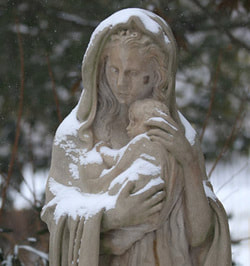


 RSS Feed
RSS Feed